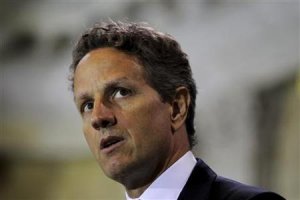According to US Treasury Secretary, Tim Geithner, European leaders “have more work to do” in regards to devising a plausible “grand plan” that can effectively deal with the eurozone crisis and restore confidence in financial markets.
Despite efforts to enhance the positive impact of the European Union’s €440 billion European Financial Stability Facility bailout fund, leaders have also received scrutiny from India and several Anglo-Saxon states who’ve accused the European Central Bank of underusing their true lending capabilities. Geithner believes that it would be less risky to “act with bold force,” then to implement gradual or incremental measures during a serious financial crisis.
Despite some diplomats stating that the Treasury Secretary’s idea of using the European Central bank as the backer of eurozone sovereign bonds should be “dismissed out of hand,” according to The Telegraph, it could also be said that the European Union did not provide adequate assurance that the recapitalisation of European banks would be conducted sufficiently, and in time to restore some of the fleeting confidence in the eurozone system.
The German Foreign Minister, Guido Westerwelle, expressed his disagreement with the U.S. Treasury Secretary’s opinion, stating that a debt crisis cannot be solved “with more debt.” Nonetheless, officials in Washington continue to monitor, and state their opinions about the developing debt crisis in Europe, with fears that a significant collapse could result in a financial contagion that spreads worldwide.
With the Atlantic rift having the potential to worsen if the eurozone debt crisis continues to escalate, there is increased pressure on EU, ECB, and European government leaders to arrange an agreement that will protect investors and help indebted eurozone nations avoid high default rates or even bankruptcy.



